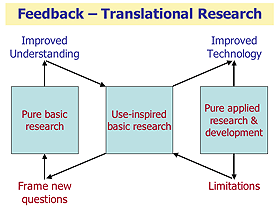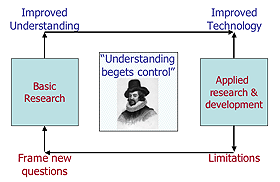|
|
Another way—and this is something which I am truly passionate about—is the concept that we've had in bioengineering for a generation, and [National Institutes of Health Director Elias] Zerhouni has lapsed onto the same phrase in the pure biomedical sciences. It's the idea of translational research; take the same model, but look at the outputs flowing the other direction. When you're working in a pure and applied area—almost always what happens in my area where we tried to translate something into the clinic—you find that there are limitations to the technology. So it's not just what's the state of the current technology but also what are the limitations of the current technology.
When you have this view of use-inspired basic research, the limitations then frame new questions. To me, the key way professionals can influence research agendas is by framing the questions. That is the heart, in my opinion, in engineering and science education . To students, the hardest problem is showing how to ask the right question, how to frame it.
That, again, leads to improved understanding and improved technologies, but if you do it right, you can go back to another old dude, Francis Bacon. Francis Bacon is usually considered the inventor of the scientific method. The idea of hypothesis testing and all that really dates to Bacon. His motivation for developing the scientific method was that understanding begets control, meaning that to change stuff and make stuff work, you’ve got to understand it first.
You have this loop—and this is the translational loop that we have in bioengineering all the time—that is, you go to applied research and development, you find out the limitations that you have, and that frames new questions, which allows you to perform basic research. It's inspired by the use, but it's a basic question that you're attacking. It gives you an improved understanding, which allows you to improve the technology. You try to apply that technology again, you find the limitations, and you just ratchet, ratchet, ratchet, ratchet this thing up as you improve on that.
>
01 02 03 04 05 06 07 08 09 10 11 12 13 14 15 16 17 18 19
|
|


|
